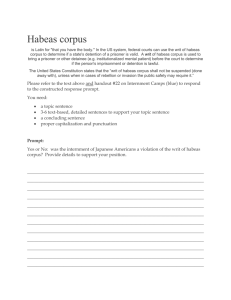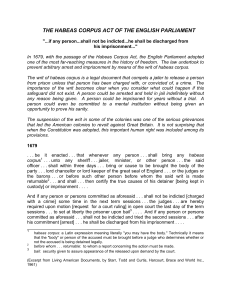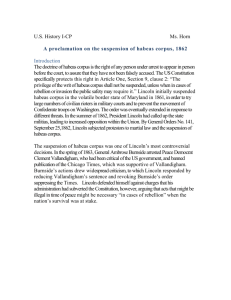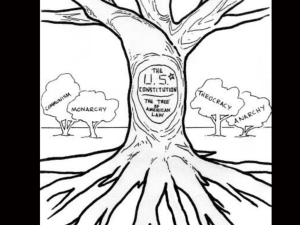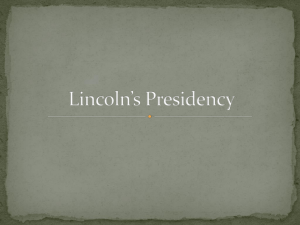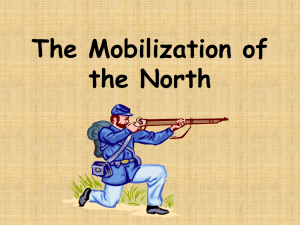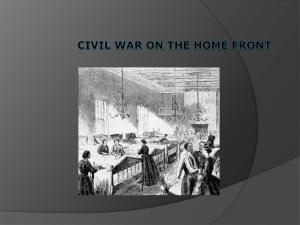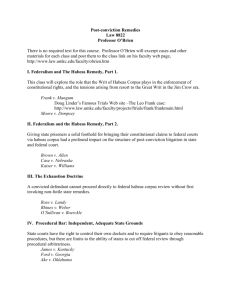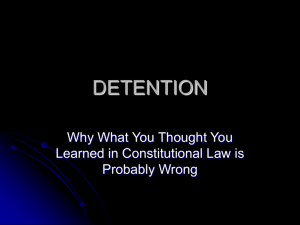Habeas Corpus_APUSH
advertisement
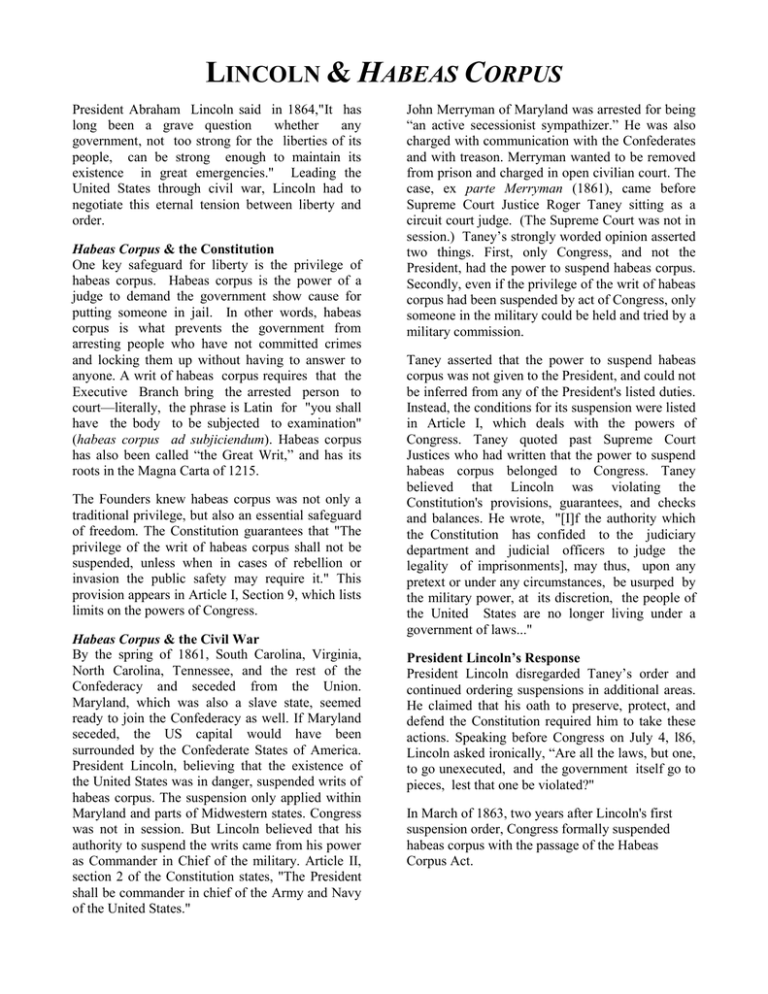
LINCOLN & HABEAS CORPUS President Abraham Lincoln said in 1864,"It has long been a grave question whether any government, not too strong for the liberties of its people, can be strong enough to maintain its existence in great emergencies." Leading the United States through civil war, Lincoln had to negotiate this eternal tension between liberty and order. Habeas Corpus & the Constitution One key safeguard for liberty is the privilege of habeas corpus. Habeas corpus is the power of a judge to demand the government show cause for putting someone in jail. In other words, habeas corpus is what prevents the government from arresting people who have not committed crimes and locking them up without having to answer to anyone. A writ of habeas corpus requires that the Executive Branch bring the arrested person to court—literally, the phrase is Latin for "you shall have the body to be subjected to examination" (habeas corpus ad subjiciendum). Habeas corpus has also been called “the Great Writ,” and has its roots in the Magna Carta of 1215. The Founders knew habeas corpus was not only a traditional privilege, but also an essential safeguard of freedom. The Constitution guarantees that "The privilege of the writ of habeas corpus shall not be suspended, unless when in cases of rebellion or invasion the public safety may require it." This provision appears in Article I, Section 9, which lists limits on the powers of Congress. Habeas Corpus & the Civil War By the spring of 1861, South Carolina, Virginia, North Carolina, Tennessee, and the rest of the Confederacy and seceded from the Union. Maryland, which was also a slave state, seemed ready to join the Confederacy as well. If Maryland seceded, the US capital would have been surrounded by the Confederate States of America. President Lincoln, believing that the existence of the United States was in danger, suspended writs of habeas corpus. The suspension only applied within Maryland and parts of Midwestern states. Congress was not in session. But Lincoln believed that his authority to suspend the writs came from his power as Commander in Chief of the military. Article II, section 2 of the Constitution states, "The President shall be commander in chief of the Army and Navy of the United States." John Merryman of Maryland was arrested for being “an active secessionist sympathizer.” He was also charged with communication with the Confederates and with treason. Merryman wanted to be removed from prison and charged in open civilian court. The case, ex parte Merryman (1861), came before Supreme Court Justice Roger Taney sitting as a circuit court judge. (The Supreme Court was not in session.) Taney’s strongly worded opinion asserted two things. First, only Congress, and not the President, had the power to suspend habeas corpus. Secondly, even if the privilege of the writ of habeas corpus had been suspended by act of Congress, only someone in the military could be held and tried by a military commission. Taney asserted that the power to suspend habeas corpus was not given to the President, and could not be inferred from any of the President's listed duties. Instead, the conditions for its suspension were listed in Article I, which deals with the powers of Congress. Taney quoted past Supreme Court Justices who had written that the power to suspend habeas corpus belonged to Congress. Taney believed that Lincoln was violating the Constitution's provisions, guarantees, and checks and balances. He wrote, "[I]f the authority which the Constitution has confided to the judiciary department and judicial officers to judge the legality of imprisonments], may thus, upon any pretext or under any circumstances, be usurped by the military power, at its discretion, the people of the United States are no longer living under a government of laws..." President Lincoln’s Response President Lincoln disregarded Taney’s order and continued ordering suspensions in additional areas. He claimed that his oath to preserve, protect, and defend the Constitution required him to take these actions. Speaking before Congress on July 4, l86, Lincoln asked ironically, “Are all the laws, but one, to go unexecuted, and the government itself go to pieces, lest that one be violated?" In March of 1863, two years after Lincoln's first suspension order, Congress formally suspended habeas corpus with the passage of the Habeas Corpus Act. DIRECTIONS: Read President Lincoln’s proclamation and answer the questions that follow. A PROCLAMATION, SEPTEMBER 24, 1862 Whereas, it has become necessary to call into service not only volunteers but also portions of the militia of the States by draft in order to suppress the insurrection existing in the United States, and disloyal persons are not adequately restrained by the ordinary processes of law from hindering this measure and from giving aid and comfort in various ways to the insurrection; Now, therefore, be it ordered, first, that during the existing insurrection and as a necessary measure for suppressing the same, all Rebels and Insurgents, their aiders and abettors within the United States, and all persons discouraging volunteer enlistments, resisting militia drafts, or guilty of any disloyal practice, affording aid and comfort to Rebels against the authority of United States, shall be subject to martial law and liable to trial and punishment by Courts Martial or Military Commission: Second. That the Writ of Habeas Corpus1 is suspended in respect to all persons arrested, or who are now, or hereafter during the rebellion shall be, imprisoned in any fort, camp, arsenal, military prison, or other place of confinement by any military authority or by the sentence of any Court Martial or Military Commission… ABRAHAM LINCOLN 1. Who wrote this document, and when was it written? 2. What two legal measures does this document announce? a. b. 3. What two reasons does Lincoln give for the measures? a. b. Writ of Habeas Corpus –legal action which requires a person under arrest to be brought before a judge or into court to prevent unlawful restraint. The basic premise behind habeas corpus is that you cannot be held against your will without just cause. To put it another way, you cannot be jailed if there are no charges against you. If you are being held, and you demand it, the courts must issue a writ of habeas corpus, which forces those holding you to answer as to why. If there is no good or compelling reason, the court must set you free. It is important to note that of all the civil liberties we take for granted today as a part of the Bill of Rights, the importance of habeas corpus is illustrated by the fact that it was the sole liberty thought important enough to be included in the original text of the Constitution. 1 SECTIONS OF THE US CONSTITUTION DIRECTIONS: Read & paraphrase the excerpts from the US Constitution below. Sections of the United States Constitution (1787) Article I, Section 82. The Congress shall have power to … provide for the common defense and general welfare of the United States… Article I, Section 9. …The privilege of the writ of habeas corpus shall not be suspended, unless when in cases of rebellion or invasion the public safety may require it. Article II, Section 23. The President shall be commander in chief of the Army and Navy of the United States, and of the militia of the several states… Article II, Section 3. [The President] shall take care that the laws be faithfully executed… Amendment I (1791). Congress shall make no law respecting an establishment of religion, or prohibiting the free exercise thereof; or abridging the freedom of speech, or of the press; or the right of the people peaceably to assemble, and to petition the Government for a redress of grievances. Amendment VI (1791). In all criminal prosecutions, the accused shall enjoy the right to a speedy and public trial, by an impartial jury of the State and district wherein the crime shall have been committed, which district shall have been previously ascertained by law, and to be informed of the nature and cause of the accusation; to be confronted with the witnesses against him; to have compulsory process for obtaining witnesses in his favor, and to have the Assistance of Counsel for his defense. 2 3 Article I of the Constitution deals with the legislative branch = Congress. Article II of the Constitution deals with the executive branch = President. DIRECTIONS: Does the President and/or Congress have the power to suspend habeas corpus throughout the entire nation, and try individuals in a military court? Use the excepts for the Constitution, along with information from the background reading, to determine if President Lincoln was justified in suspending habeas corpus and civil liberties during the Civil War. Constitutional Question Does the President and/or Congress have the Constitutional power to suspend habeas corpus and civil liberties throughout the entire nation during the Civil War? Document Article I, Sections 8 & 9 Article II, Section 2 Article II, Section 3 The First Amendment The Sixth Amendment Other information: e.g: history, precedent Does this document support Lincoln’s decision? Why? / Why not? The Rulings In ex parte Merryman (1861), Supreme Court Justice Roger Taney’s provided a strongly worded opinion that asserted two things. First, only Congress, and not the President had the power to suspend habeas corpus. Secondly, even if the privilege of the writ of habeas corpus had been suspended by an act of Congress, only someone in the military could be held and tried by a military commission. Taney asserted that the power to suspend habeas corpus was not given to the President and could not be inferred from any of the President’s listed duties. Instead, the conditions for its suspension were listed in Article I, which deals with the powers of Congress. Taney quoted past Supreme Court Justices who had written that the power to suspend habeas corpus belonged to Congress. Taney believed that Lincoln violated the Constitution’s provisions, guarantees, and checks and balances. He wrote, “If the authority which the Constitution has confided to the judiciary department and judicial officers [to judge the legality of imprisonments], may thus, upon any pretext or under any circumstances, be usurped by the military power, at its, discretion, the people of the United States are no longer living under a government of laws…” In ex parte Milligan (1866), the Supreme Court ruled that the President could not create military tribunals to try citizens as long as civil courts were operational. Mr. Milligan had the right to be tried by a jury in a civil court. The Court noted the government’s power to suspend habeas corpus in rebellion or invasion, but pointed out that the citizens’ Sixth Amendment right to trial by jury needed to be preserved. The Court reasoned that the Founders knew that “trial by an established court, assisted by an impartial jury, was the only sure way of protecting the citizen against oppression and wrong. Knowing this, they limited the suspension to one great right [habeas corpus], and left the rest to remain forever inviolable.” The ruling also defined conditions for martial law and asserted the civilian power over the military. “Martial law [military control of the justice system] cannot arise from a threatened invasion. The necessity must be actual and present; the invasion real, such as effectually closes the courts and deposes the civil administration…. Martial rule can never exist where the courts are open, and in the proper and unobstructed exercise of their jurisdiction. It is also confined to the locality of actual war.” Letter to Winfield Scott Abraham Lincoln April 25, 1861 Washington My dear Sir: The Maryland Legislature assembles tomorrow at Anapolis; and, not improbably, will take action to arm the people of that State against the United States. The question has been submitted to, and considered by me, whether it would not be justifiable, upon the ground of necessary defence, for you, as commander in chief of the United States Army, to arrest, or disperse the members of that body. I think it would not be justifiable; nor, efficient for the desired object. First, they have a clearly legal right to assemble; and, we can not know in advance, that their action will not be lawful, and peaceful. And if we wait until they shall have acted, their arrest, or dispersion, will not lessen the effect of their action. Secondly, we can not permanently prevent their action. If we arrest them, we can not long hold them as prisoners; and when liberated, they will immediately re-assemble, and take their action. And, precisely the same if we simply disperse them. They will immediately re-assemble in some other place. I therefore conclude that it is only left to the commanding general to watch, and await their action, which, if it shall be to arm their people against the United States, he is to adopt the most prompt, and efficient means to counteract, even, if necessary, to the bombardment of their cities - and in the extremest necessity, the suspension of the writ of habeas corpus. Your Obedient Servant
